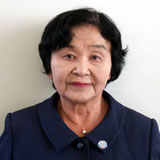 Sakue Shimohira Sakue Shimohira
Good
afternoon, my name is Sakue Shimoshira, I would like to express my sincere gratitude
to everyone from Japanese and overseas NGO’s and the people of Nagasaki, for
attending the 3rd Nagasaki Global Citizens’ Assembly for the Elimination of Nuclear
Weapons, and listening to my experience.
To tell the truth, I’d like to lock away that painful and sorrowful scar at
the bottom of my heart, and not talk about it. But 61 years after that unforgettable
day, I feel that I must pass the story on. We, the atomic bomb survivors, will
one day all be dead. I speak to you in the belief that accurately telling the
facts in the testament to my life.
The Pacific war started in December 1941, when I was six years old, and finished
when
I was ten. It fills me with sorrow to think that if only that war hadn’t happened,
that hideous atomic bomb would never have been dropped. The toughest things for
we children were that there was nothing to eat, and that we had to go school
barefoot because we had no shoes. But we did our best under the government’s
slogan of “Forget your wishes until we’ve won.”
However, the fighting intensified, and we started to lead our lives in dugouts
or air-raid shelters. On that unforgettable day of August 9th 1945, the air-raid
sirens started ringing out from early in the morning, and we children rushed
to our regular dugout, around 800 meters from the epicenter of the blast. Many
other children were hiding inside the dark hole. Presently, we heard a voice
saying, “Air-raid warning lifted, air-raid warning lifted.” Some of the children
rushed outside, but seven or eight of us, including my sister and I stayed in
the shelter.
That was the moment it happened. There was a flash of light, and the very
second that it appeared as though the hole was illuminated from corner to corner,
a violent gust of wind blew in; we were blown off our feet, dashed against the
rocks, and I fainted. Somebody slapped my head, and I regained my senses. I was
shocked: the air-raid shelter, which should have been empty, was full of people
with charred bodies; people with ripped flesh, covered in blood; people whose
eyeballs had burst out of their sockets; people whose burns had swollen their
bodies by two or three times. Everywhere people were wailing, “Give me some water,
help me!” I was scared, paralyzed with fear and unable to move. All I could do
was scream, “Mummy, help me!” My younger sister had been sent flying by the blast,and
I had no idea what had happened to my friends. My elder sister’s child had also
been sent flying. Eventually the three of us were reunited, and huddled together
screaming for help. But no help came. We could hear a voice crying, “Hey! Who’s
there? Somebody kill me!” Who looked and saw one of my older friends, Sakurai
sprawled on the ground; his stomach was burst and his intestines were hanging
out. The shelter stank of charred corpses, and we vomited as we waited for help.
At last we heard a voice from outside asking, “Hey, is there anyone alive in
there?” We replied that we were alive and yelled for help. My foster father had
come to rescue us. He helped us outside, and again I was shocked: not a single
house was left standing. There was nothing but a mountain of charred corpses
and rubble. We found the charred corpse of my elder sister at our house. My mother’s
corpse was lying next to that of a lady neighbour. My dazed brother, a medical
student at Nagasaki University, came to look for us with the help of his friends.
He was pleased that we has survived, but on August 11th he left us with the words,
“I don’t want to die, I don’t want to die,” before growing as cold as ice.
The three of us who survived fled to the countryside with the help of some
relations. The bonds between our parents, brothers and sisters had been torn
apart. Some barracks were constructed on the burnt-out fields of Nagasaki towards
the end of 1945, and we started to live there together with our other surviving
neighbours. It was an existence without electricity or food. All that was left
were bleached skeletons. A faint glow could be seen in the evenings phosphorous
emanating from the bones of the dead. Those who had managed to survive were unable
to live or die in a humane manner, being forced to struggle with an utterly unknown
disease. My younger sister tried her best, but defeated by poverty and disease,
and longing for our mother, she finally ended her life by throwing herself under
a train. I was irreconcilable as I cried out to her, tears running down my face,
“Why did you have to die? Why couldn’t you fight harder?”
Faced with the choice of finding the courage to die or the courage to live,
my sister unfortunately chose the former. But I chose the courage to live. Now
I am genuinely happy to have lived, and truly hope that future generations will
also live, whatever troubles they may face. It has been said that ‘a human life
is heavier that the Earth itself.’ I want you to understand the suffering of
the many people who have passed away whilst refusing to die in the name of war.
Let us pool our wisdom and try to build a world with no wars and no nuclear
weapons, so that nobody is ever exposed to these weapons again. In order to achieve
this, it is my heartfelt hope that the atomic-bombed city of Nagasaki sends out
a message to people everywhere that human being and nuclear weapons cannot exist
together. |

 Sakue Shimohira
Sakue Shimohira